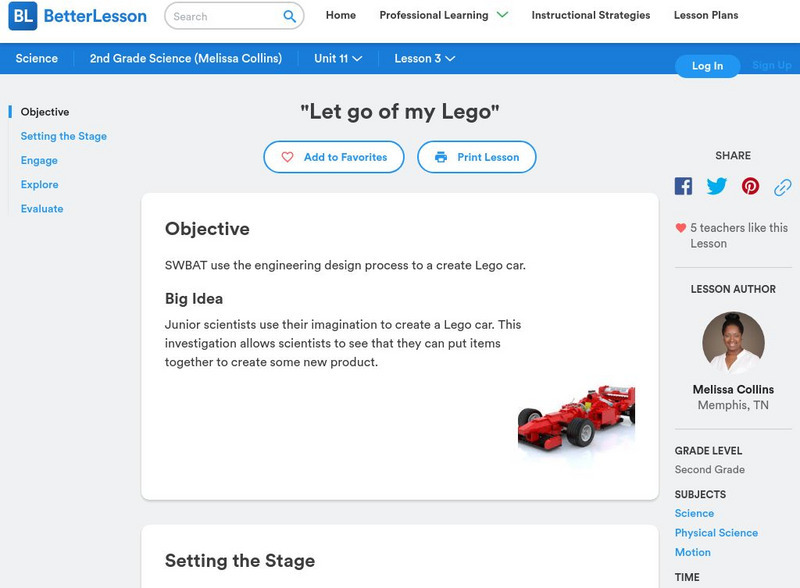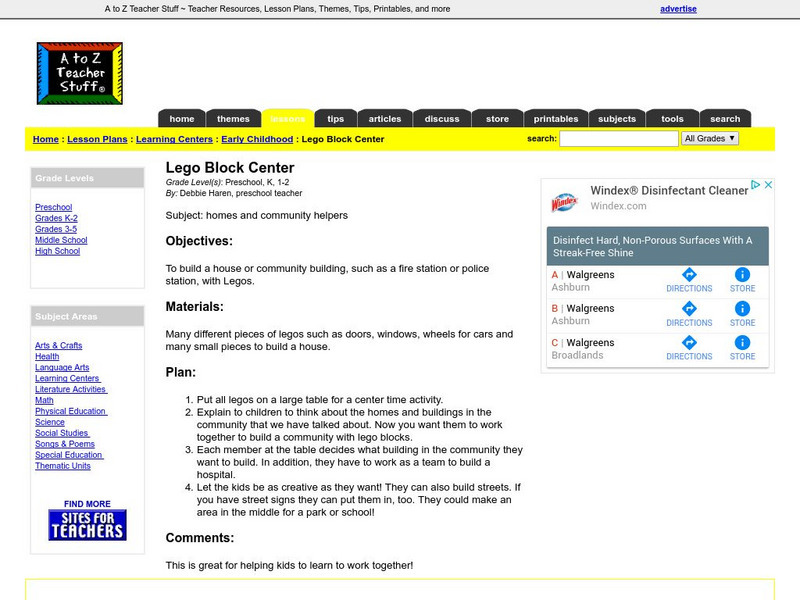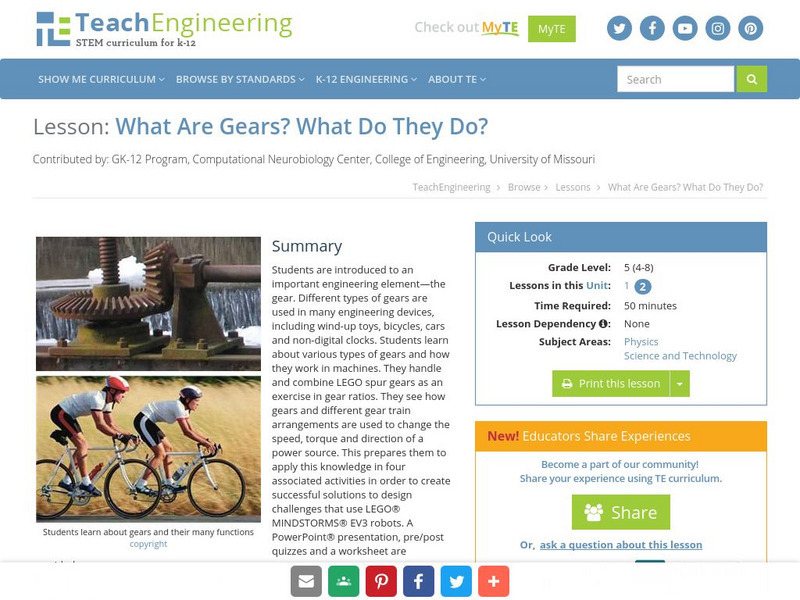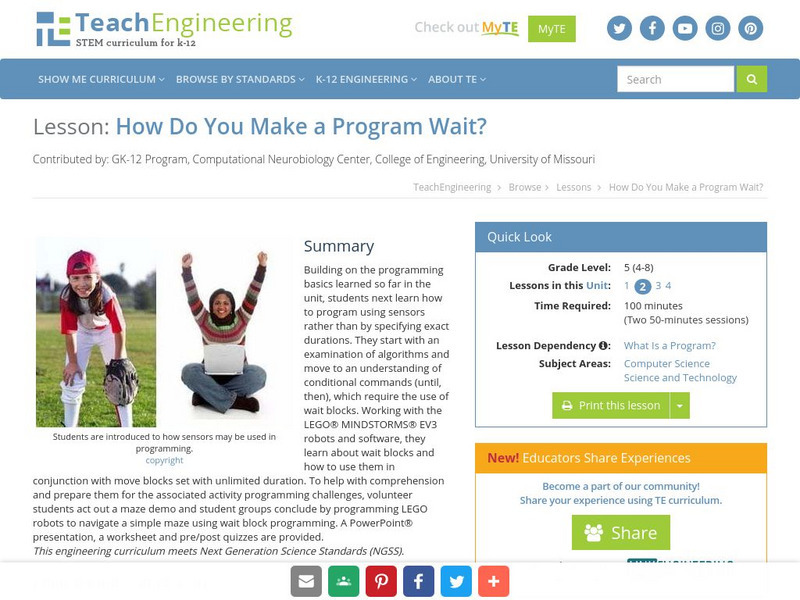Hi, what do you want to do?
Curated OER
Celebrating Explorers
Students create a PowerPoint presentation using graphics, text and animations. They access the Internet to research a topic and find historical photographs and documents to enhance learning. They demonstrate how to use an overhead LCD...
Curated OER
Using Its and It's
In this "its" and "it's" worksheet, students read the information that tells when to use each word. Students complete 30 sentences with the correct word.
Curated OER
Paste Paper
Pupils watch the teacher demonstrate the process of making paste paper. They create their own wheat paste papers following the example of the teacher. Students make several pieces of paste paper, and use them to make collages.
Curated OER
Project Yellow Bus
Students discover the uses of energy and the difference between renewable and nonrenewable resources. They participate in hands-on activities to help them explain the concept of energy.
Curated OER
Structures
Students choose which building material to use to create their structure and which animal to house. After being read a story, they examine and identify the differnet types of homes mentioned. They take pictures of their structures...
Curated OER
Electrical motors
Students investigate and experiement with a 9-volt motor. They will use the connecting wire and battery pack to discover fans.
Curated OER
Magnify The Monster In Me
Students gradually develop fine-motor movement skills with the mouse, while building on the gross-motor movements they are already able to make with the mouse. It encourages students to look at the same painting different ways, and...
Better Lesson
Better Lesson: Area and Perimeter Review Using Legos
Lesson plan in which students calculate area, build areas to a given amount, and calculate the perimeter with the use of Legos. Step by step instructions and videos are provided. CCSS.Math.Content.3.MD.C.7.c Use area models to represent...
Better Lesson
Better Lesson: "Let Go of My Lego"
Junior scientists use their imagination to create a Lego car. This investigation allows scientists to see that they can put items together to create some new product. Videos of the lesson in action and examples of student's journal...
PBS
Pbs Learning Media: Environmental Public Health: Understanding Air: Air Pollution & Modeling Pollutants With Lego Bricks
In this lesson, students learn about the chemical reactions that release various pollutants into the atmosphere and what happens when pollutants in the air are exposed to sunlight. They model incomplete combustion using LEGO bricks, and...
A to Z Teacher Stuff
A to Z Teacher Stuff: Lego Block Center (Activity)
This lesson assists in developing teamwork in kindergarten age children and encourages them to take a look at their local community and its institutions.
TeachEngineering
Teach Engineering: What Is a Robot?
This lesson introduces students to the major characteristics of robots. The associated activity uses the LEGO MINDSTORMS NXT system as an example. Before studying robots in more detail, it is important for students to consider the many...
TeachEngineering
Teach Engineering: How Does a Robot Work?
This lesson plan introduces electricity, batteries and motors using a LEGO MINDSTORMS NXT robot. The associated activity guides students to build a simple LEGO NXT set-up and see the practical implementation of the concepts discussed....
TeachEngineering
Teach Engineering: How Does a Touch Sensor Work?
Students look at human senses and their electronic imitators, with special focus on the skin and touch sensors. They have a chance to handle and get familiar with the LEGO touch sensor, including programming LEGO MINDSTORMS NXT robots to...
TeachEngineering
Teach Engineering: What Are Gears? What Do They Do?
Students are introduced to an important engineering element- the gear. This prepares them to apply this knowledge in four associated activities in order to create successful solutions to design challenges that use LEGO MINDSTORMS NXT...
TeachEngineering
Teach Engineering: What Is a Program?
Using a few blindfolds and a simple taped floor maze exercise, learners come to understand that computers rely completely upon instructions given in programs and thus programs must be comprehensive and thorough. Then students learn to...
TeachEngineering
Teach Engineering: How Do You Make a Program Wait?
Building on the programming basics learned so far in a corresponding Robotics unit, students learn how to program using sensors rather than by specifying exact durations. Working with the LEGO MINDSTORMS NXT robots and software, they...
TeachEngineering
Teach Engineering: How Do You Make Loops and Switches?
Students learn how to program using loops and switches. Using the LEGO MINDSTORMS NXT robots, sensors and software, student pairs perform three mini programming activities using loops and switches individually, and then combined.
TeachEngineering
Teach Engineering: What Is Bluetooth?
Students learn about electrical connections, how they work, and their pervasiveness in our world. Two specific skills explored are Morse code and the function of Bluetooth. Using bluetooth, they control LEGO robots remotely from Android...
TeachEngineering
Teach Engineering: Human and Robot Sensors
Students are provided with a rigorous background in human "sensors" (including information on the main five senses, sensor anatomies, and nervous system process) and their engineering equivalents, setting the stage for three associated...
TeachEngineering
Teach Engineering: What Is a Motor? How Does a Rotation Sensor Work?
Students learn about electric motors and rotational sensors. They create a basic program using the LEGO MINDSTORMS NXT interface to control a motor to move a small robot.
TeachEngineering
Teach Engineering: How Does a Light Sensor Work?
A mini-activity, which uses LEGO MINDSTORMS NXT intelligent bricks and light sensors gives learners a chance to investigate how light sensors function in preparation for the associated activity involving the light sensors and taskbots.
TeachEngineering
Teach Engineering: How Do Human Sensors Work?
This lesson highlights the similarities between human sensors and their engineering counterparts. Taking this approach enables students to view the human body as a system, that is, from the perspective of an engineer. Humans have...
TeachEngineering
Teach Engineering: How Does a Sound Sensor Work?
Students learn about how sound sensors work, reinforcing their similarities to the human sense of hearing. This instructional activity and its associated activity enable students to appreciate how robots can take sensor input and use it...




























